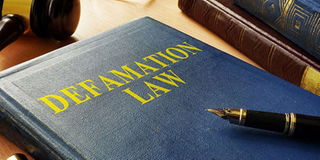‘City Girl’, freedom of expression and the rights of ‘The Prophet’

Publication of defamatory matter is deemed not to have been made in good faith if it’s made to appear that the matter was untrue. PHOTO | FILE | NATION MEDIA GROUP
What you need to know:
- The code states that any publication of defamatory matter concerning a person is unlawful unless the matter is true and it’s published for the public benefit.
- The Constitution states that the right to freedom of expression doesn’t extend to hate speech, or advocacy of hatred that constitutes vilification of others or incitement to cause harm.
Amos Kilanya, who describes himself as a concerned Kenyan and a consumer of Daily Nation news, has requested Nation Media Group to publicly apologise for what he calls “matusi” (defamation and insults) of David Owuor by Njoki Chege.
In her article, “It is time to rein in these religious quacks”, published in the Saturday Nation of February 2, Njoki says of the Ministry of Repentance and Holiness founder: “Prophet Owuor is a toxic, predatory, shameless avuncular crook hiding under a religious cloak to prey on the poor, sick and desperate people in our society.”
There has been a hue and cry, particularly in social media, following Njoki’s no-holds- barred criticism of the cleric described in his official website as “The Prophet of the Lord” who “has never asked for any offering or money” (http://www.repentandpreparetheway.org).
As a columnist, Njoki Chege is free to express her opinion — subject only to Nation Media Group editorial policy, the country’ laws, journalism ethics and standards.
RIGHT
The NMG editorial policy recognises that, as a social institution, the Press discharges crucial duties by carrying information, debates, analytical and critical comments on society.
“The Press is, therefore, particularly responsible for allowing different views to be expressed,” it states.
The Press protects the freedom of speech and of the media and it should not yield to any pressure from anybody or any institution that might want to prevent the free flow of accurate factual information, free access to sources and open debate on any matter of importance to society.”
It’s the duty of the Press, the policy further states, to publish information that should be in the public domain, on what goes on in society and to uncover and disclose matters that ought to be subjected to public debate, analysis, scrutiny or criticism in keeping with the universally acknowledged principle that the media’s primary responsibility is to the people.
“Its news and information outlets are committed to being comprehensive and accurate in content and their commentaries fair and considered. Their constant objective is to ascertain and verify the truth of what they publish insofar as this can be established.”
ETHICS
The NMG promotes media freedom balancing it “with a well-developed sense of responsibility” and “eschews journalism that is based on unattributable and unsubstantiated rumour and gossip in relation to public figures.”
Further, all NMG journalists “have a duty to maintain the highest professional and ethical standards”.
Apart from adhering to the editorial policy, they are bound by the laws of the land and universally accepted journalism ethics and standards.
The laws are the Media Council Act, the Kenya Information and Communications (Amendment) Act of 2013, the Penal Code, and the Constitution.
Section 5B of the Kenya Information and Communications (Amendment) Act states that the right to freedom of expression shall not extend to advocacy of hatred that constitutes vilification of other persons or incitement to cause harm.
Sections 194, 195, 197, and 200 of the Penal Code criminalise publishing defamatory matter with intent to defame a person.
DEFAME
The code states that any publication of defamatory matter concerning a person is unlawful unless the matter is true and it’s published for the public benefit; or it’s privileged, such as what is said in court, or the expression of opinion in good faith on the conduct of a person in relation to any public question or matter.
However, publication of defamatory matter is deemed not to have been made in good faith if it’s made to appear that the matter was untrue, and that the person publishing the information didn’t believe it to be true.
Or that the matter was untrue, and that she published it without having taken reasonable care to ascertain whether it was true or false.
Or that, in publishing the matter, she acted with intent to injure the person defamed more than was reasonably necessary for the interest of the public.
LAWS
The Constitution states in Articles 33 and 34 that the right to freedom of expression doesn’t extend to hate speech, or advocacy of hatred that constitutes vilification of others or incitement to cause harm.
Further, in the exercise of the right to freedom of expression, every person shall respect the rights and reputation of others.
The articles also indicate that freedom of the media is also subject to “media standards” and regulations set by Parliament.
These are embodied in the Code of Conduct for the Practice of Journalism in Kenya.
So should NMG apologise for the “matusi”? Yes, if what Njoki says about the prophet are statements of fact as opposed to opinion. If she cannot show them to be true, that is. Njoki attributes virtually everything to her own authority.
Send your complaints to [email protected]. Call or text 0721 989 264





